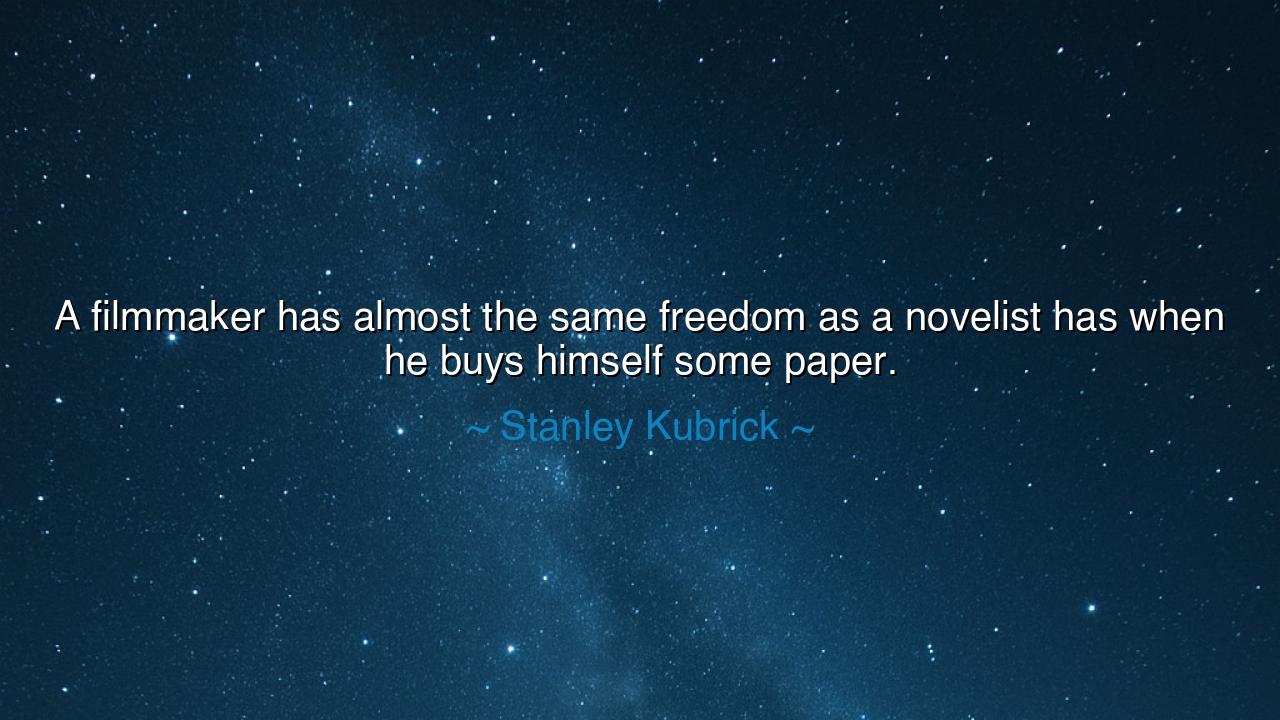
A filmmaker has almost the same freedom as a novelist has when
A filmmaker has almost the same freedom as a novelist has when he buys himself some paper.






Listen closely, O children of the future, for the words of Stanley Kubrick echo with the power of creativity and freedom: "A filmmaker has almost the same freedom as a novelist has when he buys himself some paper." These words speak to the heart of what it means to create without limitation, to wield the power of imagination in a world filled with infinite possibilities. Kubrick, a master of the cinematic arts, understood that the true strength of the filmmaker lies not in the tools at his disposal, but in the freedom to express, to shape, and to craft his own vision, as a novelist shapes the world with ink and paper. The freedom he speaks of is the freedom to create—a gift that belongs to every artist, whether in words or on film.
In the ancient world, O children, the greatest creators were not bound by the constraints of their circumstances. Homer, the blind poet of ancient Greece, created the Iliad and the Odyssey with nothing more than the power of his words, his voice, and his imagination. The epic tales of Homer were not confined by the limitations of his world but were shaped by the vastness of his mind, his understanding of the human experience, and his ability to weave stories that resonated with people across time and space. The freedom to create, to bring forth worlds from nothing, was his gift, just as Kubrick’s freedom was to take the blank canvas of film and shape it into something that transcended the ordinary.
Similarly, Leonardo da Vinci, a man whose genius spanned both the arts and sciences, had little more than a notebook and his mind to bring forth some of the most visionary works the world has ever known. His sketches, his inventions, and his paintings were born not from wealth or resources, but from the freedom to express his own vision. He had the freedom of the mind, and that freedom, unshackled by external limitations, gave birth to some of the most iconic and profound works of human history. Kubrick’s statement is a reminder that in the realm of creativity, tools—whether they be paper, film, or canvas—are secondary to the vision and the freedom to create that each artist carries within them.
In more recent times, William Shakespeare created a vast universe of characters, stories, and emotions with the simplicity of a quill and parchment. The freedom of the playwright, unrestricted by the limitations of his age, allowed him to transcend the mundane and reach into the depths of the human soul. Shakespeare was not bound by the stage; he was bound only by the limitless world of his imagination, a world that would continue to speak to audiences long after his death. In this, he too embodied Kubrick's notion of creative freedom—the freedom to craft, to shape, and to give life to something new, something that had never before existed.
Kubrick’s statement also speaks to the practicality of creativity. A filmmaker, like a novelist, has at his disposal an infinite space in which to create. A novelist needs only paper and ink to begin the work of creation, while a filmmaker can take a blank reel of film, a camera, and his vision to construct worlds, emotions, and stories from the ground up. This freedom comes not from the absence of obstacles, but from the ability to see beyond those obstacles, to push through them and create something meaningful. In Kubrick’s words, we see the power of vision and the belief that anything is possible once an artist is free to create from the heart.
What then, O children, is the lesson of this truth? The act of creation is not confined by the world’s limitations but is instead a force that transcends them. Just as Homer was not bound by blindness, just as Shakespeare was not confined to the stage, and just as Kubrick was not limited by the constraints of film, so too are you, O children, free to create. The tools of creation are within your reach, whether in words, in art, in music, or in any form of expression. The freedom to create lies within you, not in the material world but in your own vision, in your own imagination. What you need is the courage to take that first step, to begin the work with the simple tools before you, and let the process of creation unfold.
And so, O children, take this wisdom with you: the freedom to create is the greatest gift you can claim. Whether you are a painter, a writer, a filmmaker, or a philosopher, you possess the power to shape the world through your imagination. Never forget that, like the greatest artists of history, you too have the ability to transcend the limitations of your circumstances. Your tools may be simple, but your vision is infinite. The world is waiting for the creations only you can bring forth. So, create boldly, create freely, and in doing so, you will leave a mark upon the world that will endure for generations to come.






AAdministratorAdministrator
Welcome, honored guests. Please leave a comment, we will respond soon